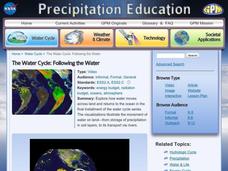Kids Learning Videos
Types of Transportation! Learning Modes of Transport for Kids
Learn about transportation! This is a great video for kids to learn about different ways to travel. Each one of these methods of transportation are fun, unique, and interesting. Children will love the real video footage of...
Encyclopaedia Britannica
Encyclopaedia Britannica Presents: WWII Infographic Explainers: Landing Craft of World War II
Hear Encyclopaedia Britannica editor Michael Ray talk about the different types of landing craft used to transport U.S. troops and equipment during World War II.
FuseSchool
Different Types of Fuels for Transportation
Learn the basics about the different types of fuels, and their roles in transportation, as a part of environmental chemistry.
Learning Mole
Different Types of Plants
A video created for, and aimed at primary school science students learning all about plants. This video explores different types of plants from land plants to underwater plants.
Kids Academy
Your Community | Types of Community | Kids Academy
Your Community | Types of Community | Kids Academy Your Community | Types of Community | Kids Academy Does your kid know about the community? Do you know how to explain it to them? Well, don’t worry this tutorial will help you explain...
Professor Dave Explains
Overview of Plant Classification: Vascular and Nonvascular Plants
Now that we have covered most of the basics regarding plant structure and function, it's time to start digging into all the different types of plants, how they are classified, and their evolutionary history. It's even more fascinating...
Mazz Media
Wind Erosion
Using footage of dust and sand storms, this program demonstrates that wind erosion moves small particles and is prevalent in dry areas where water does not hold surface particles together. Students will learn that once the particles are...
Weatherthings
Weather Things: Wind
The 3 simple ingredients of sun, air and water lead to every type of weather on Earth. The atmosphere is constantly trying to balance heat from the sun with water vapor and air to create a dynamic planet. The unique properties of the...
MinuteEarth
Why Do Rivers Have Deltas?
Where rivers meet the ocean, coastlines tend to bend either inward or outward, creating estuaries and deltas. But how do they get those shapes? A huge thank-you to the following organizations, all working toward sustainable deltas, for...
Science360
Engineering the spark that starts wildfires
Hot metal fragments can be created from power lines, overheated brakes, railway tracks, or any other manner of metal-on-metal action in our industrialized society. The particles can reach more than 5,000 degrees Fahrenheit, around the...
FuseSchool
What Is The Rock Cycle?
In this video you will learn about the dynamic rock cycle. Plant roots help to create new soil from the solid rock and they get nutrients and support from the soil. This solid rock is often sandstone or granite. They are made up of...
The Great War
Submarines, Dreadnoughts and Battle Cruisers - The Navies of World War 1 I THE GREAT WAR - Special
Even though there was only one major naval battle in the Atlantic during World War 1, the navies played a huge role during the entire conflict. From troop transports to supplies and from unrestricted submarine warfare to the landing at...
Curated Video
What Is The Rock Cycle? | Environmental Chemistry | Chemistry | FuseSchool
In this video you will learn about the dynamic rock cycle. Plant roots help to create new soil from the solid rock and they get nutrients and support from the soil. This solid rock is often sandstone or granite. They are made up of...
Mazz Media
Coal
This live-action video program is about coal The program is designed to reinforce and support a student's comprehension and retention of the term through use of video footage, photographs, diagrams and colorful, animated graphics and...
NASA
The Water Cycle: Following the Water
Water that leaves the oceans must eventually return. The animations in the final lesson of the four-part NASA series show the complex path water can take across landforms before returning to the ocean. Approximately one-third of the...







